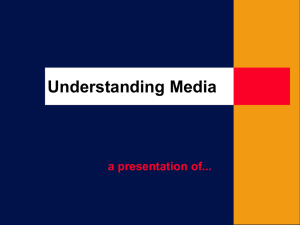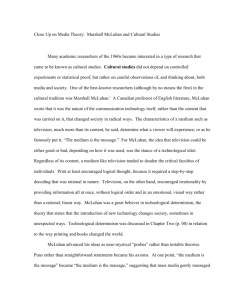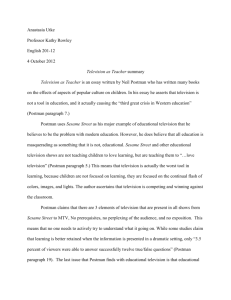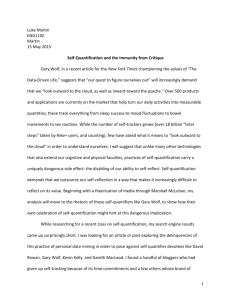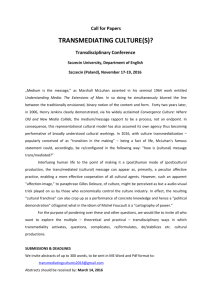Technological determinism
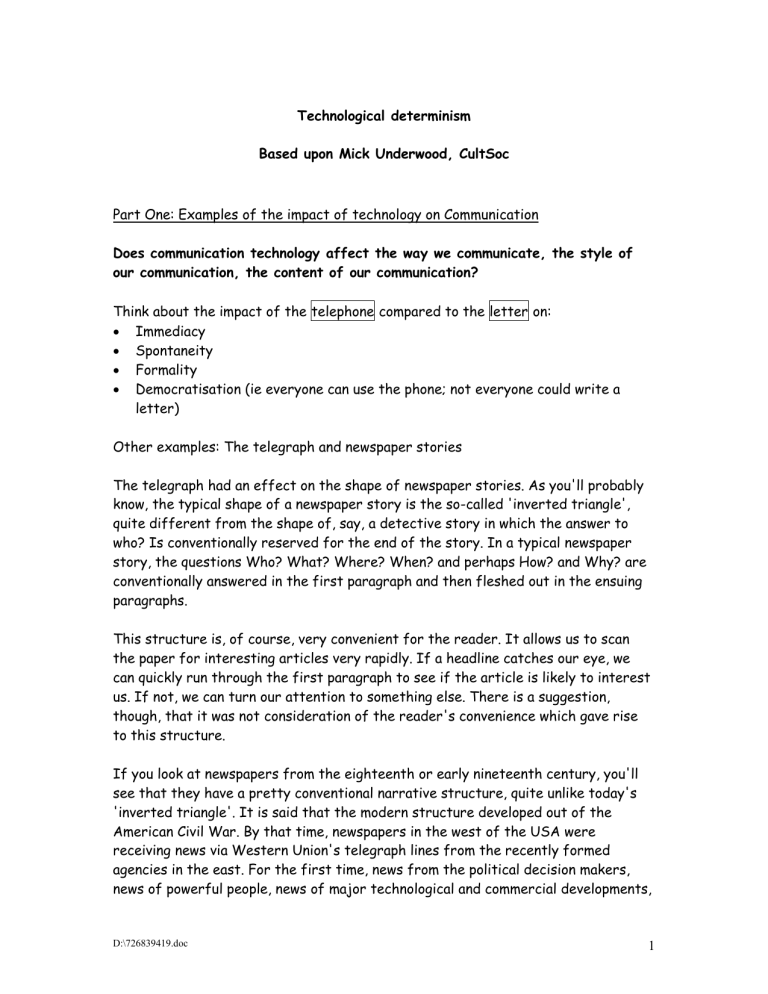
Technological determinism
Based upon Mick Underwood, CultSoc
Part One: Examples of the impact of technology on Communication
Does communication technology affect the way we communicate, the style of our communication, the content of our communication?
Think about the impact of the telephone compared to the letter on:
Immediacy
Spontaneity
Formality
Democratisation (ie everyone can use the phone; not everyone could write a letter)
Other examples: The telegraph and newspaper stories
The telegraph had an effect on the shape of newspaper stories. As you'll probably know, the typical shape of a newspaper story is the so-called 'inverted triangle', quite different from the shape of, say, a detective story in which the answer to who? Is conventionally reserved for the end of the story. In a typical newspaper story, the questions Who? What? Where? When? and perhaps How? and Why? are conventionally answered in the first paragraph and then fleshed out in the ensuing paragraphs.
This structure is, of course, very convenient for the reader. It allows us to scan the paper for interesting articles very rapidly. If a headline catches our eye, we can quickly run through the first paragraph to see if the article is likely to interest us. If not, we can turn our attention to something else. There is a suggestion, though, that it was not consideration of the reader's convenience which gave rise to this structure.
If you look at newspapers from the eighteenth or early nineteenth century, you'll see that they have a pretty conventional narrative structure, quite unlike today's
'inverted triangle'. It is said that the modern structure developed out of the
American Civil War. By that time, newspapers in the west of the USA were receiving news via Western Union's telegraph lines from the recently formed agencies in the east. For the first time, news from the political decision makers, news of powerful people, news of major technological and commercial developments,
D:\726839419.doc
1
as well as international news was appearing in newspapers in the west. During the war, however, the telegraph wires were constantly being cut as each side tried to disrupt the other's lines of communication. If your news item has a conventional narrative structure, a large chunk can go missing if the wires are cut early in the transmission. The readership's recently aroused interest in national and international news is disappointed and the agency runs the risk of losing its press customers because only a part of the news is getting through. As a result, the agencies adopted a new structure which would ensure that at least the bare bones of the story got through, then a bit more detail, then a bit more and so on, thus allowing for the possibility of disruption.
That's a fairly clear example of a technological effect on communication, though I rather suspect it's not the whole story
Perfect binding and pulp fiction
Chepa printing and binding techniques led to the paperback, which led to pulp fiction
– especially detective, Western and romantic novels. Quite suddenly, a cheap method of mass production became available to publishers, who were naturally keen to exploit the extra capacity. They now had the possibility of mass production for a mass public and, of course, were only too happy to develop 'formulas' which worked with their new, relatively poor and relatively poorly educated, readership and so the formulaic novel was born. Was the sudden development of pulp fiction due to
'technology push', was it due to the capitalist mode of publishing, or was it due to
'consumer pull'?
The printing press
Could we have mass literacy without mass publications? Could the French Revolution have taken place without the spread of radical ideas through the 'philosophes'' books and, perhaps more importantly, illegal pamphlets? Would we now have the image we do of the Spanish Inquisition if the supporters of the Reformation had not been so successful in disseminating their anti-Catholic propaganda? Could the
Renaissance have taken place without the rapid spread of knowledge? And, of course, the question underlying all of those questions is: could any of those events have taken place without the invention of movable type by Gutenberg in the middle of the fifteenth century?
Transport systems
Stefik (1999) describes how the development of roads and railways in France between 1870 and 1914 turned 'peasants into Frenchmen' in the space of forty
D:\726839419.doc
2
years. Until after the middle of the nineteenth century most French citizens' life was limited to their immediate vicinity - their village and the occasional trip to the local market town. In winter, most local roads became almost completely impassable.
Stefik refers to the transportation system as having transformed France into a
'marketplace for memes'.
Computers
Currently, of course, there is speculation about the way that information and communication technologies (ICTs) may be determining our world, its social structures and economies, as well as individual consciousness. As with any new technology, the debate is frequently couched in alarmist and reactionary terms.
Concern is also expressed that computers may be affecting consciousness.
It is suggested that some young people who spend much of their time in chat rooms and other simulated environments may be developing' multiple personae', a sort of fragmented self, or rather a variety of possible selves which are discarded and assumed as appropriate to negotiate the variety of virtual worlds they explore. The fear is that this fragmentation will lead computer users to experience life as a series of disconnected narratives rather than as something fundamentally grounded in shared social experience, with that experience's attendant shared values and beliefs.
Part Two: The Theory: Determinism
The view that the communication technologies we use have effects on how and what we communicate, when we communicate, the frequency of our communication and so on, rather than serving simply as a new medium for us to communicate pretty much the same old content in pretty much the same old style is often referred to as technological determinism or, more broadly, media determinism.
Linguistic determinism
If you've already looked at the Sapir-Whorf hypothesis, you'll be familiar with the notion of linguistic determinism, the idea that the linguistic codes we use shape our perception of the world and, indeed, even limit what we are able to perceive in the first place. You'll also be aware that there's a wide range of views on the subject.
They range from the strong Whorfian hypothesis that our perception, our social practices, our social structures and so on are almost entirely determined by our language (in fact, if you consider the importance accorded to language by some post-structuralist thinkers, our consciousness, our unconscious and our very notion
D:\726839419.doc
3
of ourselves as individuals are conditioned by the language system we are born into) through to acceptance of a much weaker version, something like: language plays an important rôle, but its effects are limited by a variety of psychological factors, such as innate personality traits, and sociological factors, such as class, context and so on.
Technological determinism a) Strong determinism
Marshall McLuhan
Consider, for example, McLuhan's claims for the effects of typography. Where typography is concerned, McLuhan points to the 'ingraining of linear, sequential habits' and 'the homogenizing of experience in print culture'. He considers the reduction of experience to the visual sense only (through increased reading) as having had a profound effect upon human arts, sciences and sensibility. For example, in McLuhan's view, the habit of adopting a 'fixed point of view' as a reader of typography led to the development of perspective drawing (1962: 125).
Not only that, but McLuhan sees typography as 'the means and occasion of individualism and self-expression in society' as well as the 'means of fostering habits of private property, privacy and many forms of "enclosure"' (131)
Typography, in creating a uniform and repeatable commodity to which the notion of authorship was attached (a notion unfamiliar to the world of scholarly manuscripts),
'created modern markets and the price system inseparable from literacy and industry' (164) Thanks to typography, books could be produced on an 'industrial' scale by men who had a living to make and were driven to make a profit on their very considerable capital investment in the printing presses. The capitalist profit motive drove them to look for wider markets for their products. As a result, ever more books were produced in the vernacular, which soon overtook Latin as the language of literacy and scholarship. These are only a few of the major effects which McLuhan claims for a single invention in communication technology. (1964: 18)
McLuhan takes issue with the claim which some commentators would make that the technologies we use are in themselves neutral and that it is what we do with the technologies which is the important question. For example, he claims that machines fundamentally altered our relations to one another and ourselves and whether we used them to make 'cornflakes or Cadillacs' is of no significance. The effect of machine technology was to restructure human work and association by the technique of fragmentation. He castigates as 'somnambulists' those who pretend that it is the use we make of technologies that determines their value and compares such claims to a claim that 'the smallpox virus is neither good nor bad; it is the way that it is used that determines its value.' For Mcluhan, the 'formative
D:\726839419.doc
4
power in the media are (sic) the media themselves'. The media should be seen as staples or natural resources, just like coal, cotton, fish and so on. Just as a society is conditioned by its reliance on a few staples, so societies are shaped by the media they use. The media affect the way that individuals act and interact in the reception of media messages, changing the social organization of everyday life.
Thus, for McLuhan, 'the medium is the message' (1964: 7)
If we accept McLuhan's claims for the effects of print, then we should expect computers to have a significant impact on our consciousness. If we accept that print fostered the development of individualism and private property, then we might well expect that networked computers will have the opposite effect. Writing for the Web is not a solitary, individualistic activity. We receive feedback, commentary and contributions from readers. We find that we are quoted in their articles, applaudingly or disparagingly. Looking for support for an argument we are developing, we discover counter-arguments. Reading some expert's authoritative article on a given topic we find ourselves drifting away into critiques of the article, eventually perhaps arriving at articles which are only peripherally connected to the original, or perhaps not at all. I receive mails asking me who wrote these articles and when, so that they may be 'properly' referenced, but I also find some of them quoted wholesale on the Web with no attribution. I receive mails asking for permission to download and incorporate the articles into CDs which are to be distributed to communication students, but also note from my log files that some academic institutions download the whole site. So the notion of 'my' authorship,
'my' individuality, 'my' intellectual property disappears as I become, as Lyotard puts it, just another 'nodal point of specific communication circuits' (Lyotard 1984)
Neil Postman
The former McLuhan student, Professor Neil Postman, seems sometimes also to adopt a strongly deterministic viewpoint. According to him we now live in what he calls a technopoly. He draws a significant distinction between this contemporary state of things and the nineteenth century technocracy. 'Technocracy' characterizes a society which took technology seriously and was determined to derive advantages from its deployment, but still retained its traditional myths, moral rules and so on in a creative and vital clash between the old and the new.
'Technopoly', on the other hand, characterizes a society in which 'these ways--the old world, myths and symbols, icons and mores of the non-technological world--have been rendered irrelevant by the overwhelming power and force of a technological world view' (Wilson/Postman 1997), a society which surrenders all to the primacy of technological development and innovation. A consequence of the sovereignty of technology is the development of 'invisible technologies' which rely on a
D:\726839419.doc
5
mechanistic, technology-oriented view of the world, such as IQ tests, standardized forms, opinion-polling techniques, all of which are characteristic of an obsession with 'objectivity' and 'measurability'. In this culture, television has become the
'command centre', which we turn to for our knowledge about current affairs, politics, commerce, news, entertainment, culture:
Sometimes when I go to the places and people ask me what ah what Americans are like, I say well what we do is watch television. That's our job here. And indeed you have to watch television in a sense to be an American because in order to make contact with whatever is happening in the culture you have to be familiar with what's on television.
Cherniak/Postman (1997)
Television reality is the reality. Baseball stadiums have huge television screens because the fans would feel cheated if they had not seen the action on TV. People are involved in major catastrophes, but their experiences are not real to them until they have seen the catastrophe on TV.
Television is responsible for what Postman calls the 'great symbol drain'. It needs symbols to be repeated endlessly, but the more they are used the more they are emptied of their meaning. Television is a medium almost incapable of presenting ideas since ideas are essentially words and television by its very nature foregrounds moving images, leading us into an image culture, where politics becomes an aesthetic competition and religion showmanship. There is no room for background, history, tradition, television is always present.
'Technology is ideology', according to Postman, and to maintain that technology is ideologically neutral is 'stupidity plain and simple' (p.162). I would recommend serious attention by any student of communication to the series of questions
Postman asks about the nature of information, its uses and effects.
According to Postman, the high degree of literacy in eighteenth and nineteenth century America led to the development of a certain kind of understanding of civil society, its purpose and the individual's rôle in it. That understanding has been subverted by television. The danger now is not from control of information, but rather that all information has become mere entertainment. The society we live in is not the nightmare of Orwell's 1984, but of Huxley's Brave New World. Douglas
Kellner (1984) takes a similar view of Orwell, whose novel he sees as having portrayed something like the totalitarian societies of Nazism and Stalinism. 1984's television has a single channel, it can never be swtiched off, it is under the total
D:\726839419.doc
6
control of the state bureaucracy - quite different from today's television. By contrast, Huxley's Brave New World, with its portrayal of a society in which people accede to the existing power structure through hedonism, is closer to our modern societies. Kellner compares Orwell's vision of totalitarianism operating by brute force with Marcuse's analysis of advanced capitalist societies (which he described as 'totalitarian') operating through more subtle methods of mass persuasion, consumerism and the delayed gratification of false needs.
B: Weaker variants of determinism
What alternatives are there to the strong deterministic view? In a way the strong determinist argument is almost self-defeating: if the technology is as strongly deterministic as all that, how come McLuhan can stand outside it and critique it?
A less strongly deterministic stance adopted by some commentators is rather that the technologies we use facilitate new forms of communication, offer possibilities which we may or may not develop. They may have already contained within their very structure, as McLuhan suggests, the seeds of radical social and psychic change, but we don't have to plant and nurture those seeds, nor do we have to allow the technologies to develop in any pre-determined way. Technologies do no doubt, as Richard Sclove (1995) puts it, 'constitute part of a society's core political infrastructure', just as do laws regulating behaviour and taxation, but I think it's worth making the point that they are not likely to be any more predictable in their effects than those. Sclove himself quotes the example of the Spanish village of
Ibieca, where running water was introduced in the 1970s. As families purchased washing machines, so the public fountain and laundry became redundant, a change which had a significant effect on the structures of village life, the sense of community disappearing with the loss of the focal points of social interaction. But technology may also lead to other forms of social interaction – eg chatrooms.
The phenomenal development of the Internet is a contemporary case in point:
... the reasons why certain paths of innovation are followed and others ignored do not lie in some inherent logic within technology. McLuhan was wrong! On the contrary, states, companies and communities devote time and effort to researching and developing technologies which are useful for their own purposes. For instance, the Net was created by the state for military communications, was improved by amateurs as a form of horizontal communications and is now being further advanced by corporations who want to make money from "interactive TV".
Barbrook/Henroux (1997)
D:\726839419.doc
7
Melvin Kranzberg's First Law reads as follows: Technology is neither good nor
bad, nor is it neutral.
Castells considers the case of China, which, until the Ming and Qing dynasties around 1400, was on the brink of industrialization, far in advance of the rest of the world when, relatively suddenly, the state turned China's back on further technological development. In Castells' view the destinies of societies are profoundly dependent on their ability or inability to master technologies, particularly those which emerge as strategically important in any given historical period. And yet, in the final analysis, it would not be accurate, as he sees it, to adopt the 'strong determinist' view and see technology itself as determining a society's development, but rather to see the influence of the technology as crucially dependent upon the uses (largely under the influence of the state to which societies put those technologies. (1996 : 7)
Technology adoption
It is certainly not the case that any technology will necessarily have some inherent quality which causes its broad adoption in society. Betamax, for example, provided better picture quality than VHS; videotext has been enormously successful in
France's Minitel system, but failed to make any significant in the USA despite millions of dollars of investment and Britain's Prestel eventually faded away; digital compact cassette offered very high quality recording and backward compatibility with ordinary analogue tapes, but seems to have disappeared completely. Geoffrey
Moore (1991 and 1995 in Stefik (1999)) has described the 'technology life cycle' as consisting of the following stages:
1 Early market
The stage where we find innovators and early adopters. The innovators pursue the new technology aggressively, perhaps focusing on pilot studies to test the new technology. Next the early adopters will spot and use the developing technology because it meets their needs, or perhaps can be adapted to their needs. In addition to these two groups, an important role is played by the technology watchers, those who keep an eye on new developments and report back on their possible uses, their maturity, the rate of progress in the pilot studies and so on.
2 The chasm
This is a crucial moment in the development of any technology. At this stage, the early enthusiasm for the product has started to level off, the potential early adopters have adopted it, but it is still too immature for mass adoption. This was
D:\726839419.doc
8
the stage the personal computer was at before the invention of the 'killer app', the spreadsheet. The nerds and geeks had them for messing around in hexadecimal and assembly language, the university departments had them for running specially written programs, but there was no obvious way to cross the chasm to the mass market. Moore also refers to the chasm as the bowling alley, where promoters of a new technology take aim at certain pins, trying to fit the technology into a variety of niche markets. With personal computers, the office certainly became such a niche, with spreadsheets and wordprocessors successfully marketed to fill a need, but the home became one too, parents being persuaded that their children needed to 'know about computers' and kids being persuaded that they wanted to play games on a screen rather than in the back yard.
3 The early majority
If a technology successfully crosses the chasm it is taken up by the early majority.
Moore refers to this stage as the tornado because of the rapid change and growth which accompany it, social change, but also rapid change in the technology as the marketers and producers compete to hold on to the market they have achieved by adding features to their product and hopefully refining it in ways which will encourage its further adoption, for example by adding timers and remote controls to the video recorder, mice and graphical user interfaces to the computer.
4 The late majority
At this stage, the adopters are joined by those who have preferred to wait until the technology is fully matured and, probably, less expensive, as has been the case with the personal computer over the past couple of years.
5 End of life
As consumers' requirements change, so the technology may no longer be the appropriate one to fulfil them and so it reaches the end of its life. There may, however, be a lengthy period of stagnation, where newer, more promising technologies will fail because of the installed user base of the existing technologies. The most often quoted example is the QWERTY keyboard. The installed user base of typewriters with a keyboard designed to stop the metal keys jamming if a typist typed too fast has until now meant that the QWERTY keyboard's dominance is virtually unassailable even though there are obviously no keys which are likely to jam.
GB, April 10, 2020
D:\726839419.doc
9


